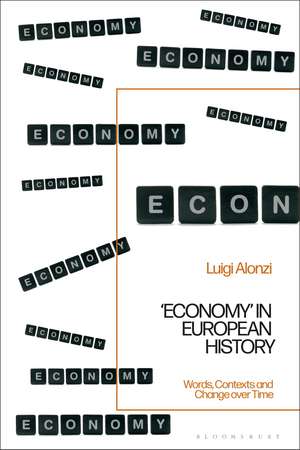'Economy' in European History: Words, Contexts and Change over Time
Autor Luigi Alonzien Limba Engleză Paperback – 20 sep 2023
| Toate formatele și edițiile | Preț | Express |
|---|---|---|
| Paperback (1) | 191.85 lei 6-8 săpt. | +71.74 lei 6-12 zile |
| Bloomsbury Publishing – 20 sep 2023 | 191.85 lei 6-8 săpt. | +71.74 lei 6-12 zile |
| Hardback (1) | 540.23 lei 6-8 săpt. | |
| Bloomsbury Publishing – 23 mar 2022 | 540.23 lei 6-8 săpt. |
Preț: 191.85 lei
Preț vechi: 249.64 lei
-23% Nou
Puncte Express: 288
Preț estimativ în valută:
36.72€ • 38.01$ • 31.03£
36.72€ • 38.01$ • 31.03£
Carte tipărită la comandă
Livrare economică 06-20 martie
Livrare express 29 ianuarie-04 februarie pentru 81.73 lei
Preluare comenzi: 021 569.72.76
Specificații
ISBN-13: 9781350276765
ISBN-10: 1350276766
Pagini: 256
Dimensiuni: 156 x 234 x 25 mm
Greutate: 0.36 kg
Editura: Bloomsbury Publishing
Colecția Bloomsbury Academic
Locul publicării:London, United Kingdom
ISBN-10: 1350276766
Pagini: 256
Dimensiuni: 156 x 234 x 25 mm
Greutate: 0.36 kg
Editura: Bloomsbury Publishing
Colecția Bloomsbury Academic
Locul publicării:London, United Kingdom
Caracteristici
Offers the first cohesive overview of contexts and history of key definitions in the study of economic history
Notă biografică
Luigi Alonzi is Professor of Early Modern History at University of Palermo, Italy.
Cuprins
IntroductionPart I. Oeconomica: From Ancient Times to the Middle Ages and Renaissance1. The 'Classical' Discoursse of the Oeconomica2. The Oeconomica from the Middle Ages to the RenaissancePart II. Household Management and Power to Command3. Oeconomy and Politics in Italy4. Oeconomy and Politics in FrancePart III. Lexicography of Oesconmia and discourses upon the Scientia eoconomica5. Oeconomia: Dictionaries and Encyclopedias6. Scientia Oeconomica and Natural LawPart IV. Semantic of Economy: Order and Administration7. The Adjectiv 'Oeconomic': Economic Prudence, Economic Order, Economic Commerce8. The Noun 'Oeconomy': Economy of Religion, Economy of Nature, Animal EconomyPart V. The Renaissance of the Term 'Political Economy'9. Commerce, Finance and the Origins of Political Oeconomy10. The New Life of the Term 'Political Oeconomy'Select BibliographyIndex
Recenzii
Luigi Alonzi's groundbreaking book is situated at the crossroads between philology and economics. His close analysis of concepts ranges from ancient Greece to the eighteenth century and from household management, via moral philosophy, to political economy. He offers fresh insights into both the intellectual and the economic history of preindustrial Europe.
An eloquently written and clearly argued work, Alonzi's book provides illuminates insights into the complex trajectories of the concept of economy across different times of European history. With remarkable interdisciplinary breadth and empirical depth, it makes an intriguing case for transformations, confrontations and non-teleological narratives of the concept's plural pasts.
An eloquently written and clearly argued work, Alonzi's book provides illuminates insights into the complex trajectories of the concept of economy across different times of European history. With remarkable interdisciplinary breadth and empirical depth, it makes an intriguing case for transformations, confrontations and non-teleological narratives of the concept's plural pasts.
